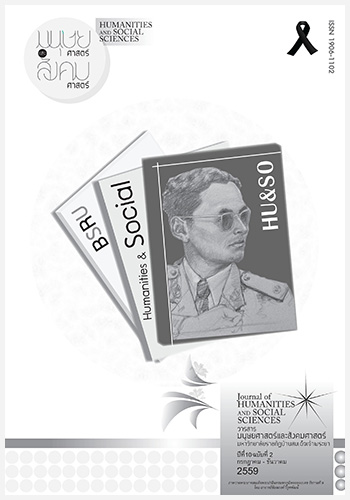การพัฒนาการเรียนการสอนด้านการฟังและการออกเสียง ภาษาอังกฤษด้วยการเรียนรู้ผ่านเครื่องมือสื่อสาร
คำสำคัญ:
การเรียนรู้แบบเคลื่อนที่ผ่านเครื่องมือสื่อสาร, การพัฒนาภาษาอังกฤษ, การฟังและการออกเสียงภาษาอังกฤษบทคัดย่อ
การศึกษาเรื่องนี้มีวัตถุประสงค์เพื่อ 1) ศึกษาวิธีการเรียนการสอนด้านการฟัง และการออกเสียงภาษาอังกฤษด้วยการเรียนรู้แบบเคลื่อนที่ผ่านเครื่องมือสื่อสาร และ 2) วิเคราะห์และสังเคราะห์ให้ได้แนวทางในการพัฒนาการเรียนการสอนด้านการฟังและ การออกเสียงภาษาอังกฤษด้วยการเรียนรู้แบบเคลื่อนที่ผ่านเครื่องมือสื่อสารด้วย Mobile learning ของสถาบันอุดมศึกษา เพื่อให้นeไปใช้ในการสร้างผลสัมฤทธิ์กับผู้เรียนให้มี คุณลักษณะในอนาคตเพิ่มขึ้น โดยทำการวิจัยจากเอกสารได้แก่ หนังสือ วารสารวิชาการ การประชุมทางวิชาการ ทั้งในประเทศและต่างประเทศ การประชุมทางวิชาการ เอกสาร ของหน่วยงานที่เกี่ยวข้อง และอินเตอร์เน็ต นำมาวิเคราะห์ สังเคราะห์ ให้ได้องค์ความรู้ ในการตอบวัตถุประสงค์ของการศึกษา
ผลการวิจัย สรุปได้ว่า การพัฒนาการเรียนการสอนด้านการฟังและการออกเสียง ภาษาอังกฤษด้วยการเรียนรู้แบบเคลื่อนที่ผ่านเครื่องมือสื่อสารแบบ Mobile learning จะเป็นวิธีการเรียนการสอนใหม่ที่สอดคล้องกับเป้าหมายทางการศึกษาและเกิดความ มีประสิทธิผลมากที่สุดในอนาคตที่จะเป็นประโยชน์ต่อผู้เรียน ผู้ที่เกี่ยวข้อง สังคมและ ประเทศชาติ ต่อไป
เอกสารอ้างอิง
Bray, E., K. Aoki & L. Dlugosh, (2008). Predictors of learning satisfaction in Japanese online distance learners. Internationnal Review of Research in Open and Distance Learning. 9 (3).
Cohen, A. D. (2012). Strategies : the interface of styles, strategies, and motivation on tasks. Language Learning Psychology : Research, Theory, and Pedagogy. Basingstoke, England : Palgrave Macmillan.
Collis, B. (1996). Tel E-learning in a Digital World : the Future of Distance Learning. London : International Thompson Computer Press.
Crosling, G. & I. Ward. (2002). Oral communication : the workplace needs and uses of business graduate employees. English for Specific Purposes. 21, 41-57.
Dörnyei, Z. (2001). Motivational Strategies in the Language Classroom. Cambridge : Cambridge University Press.
Flowerdew, J. & L. Miller, (2005). Second Language Listening : Theory and Practice. Cambridge : Cambridge University Press.
Grainger, P. R. (1997). Language-learning strategies for learners of japanese : investigating ethnicity. Foreign Language Annals. 30 (3), 378-385.
Griffiths, C. (2003). Patterns of language learning strategy use. System. 31 (3), 367-383.
Harvard Extension School. (2016). Distance Education : Online Courses at Harvard. Retrieved 6 August 2016. From http://www.extension. harvard.edu/distance-education.
Harrison, R. (2002). Wireless learning with eClass2go. Proceedings of the European Workshop on Mobile and Contextual Learning. New York : CRC Press.
Helgesen, M., & S. Brown. (2007). Practical English Language Teaching : Listening. New York : McGraw Hill.
Holme, O. & M. Sharples. (2002). Implementing a student learning organizer on the pocket PC platform. Proceedings of the European Workshop on Mobile and Contextual Learning. London : Fontana.
Koppi, T. (2002). Authentic contextual lifelong learning design. Proceedings of the European Workshop on Mobile and Contextual Learning. New York : Oxford University Press.
Koshy, V. (2005). Action Research for Improving Practice : a Practical Guide. London : SAGE.
Maleki, A. (2007). Teach ability of communication strategies : an Iranian experience. System. 35 (4), 583-594.
Malliou, E., et al. (2002). The AD-HOC project : eLearning anywhere, anytime. Proceedings of the Europeain Workshop on Mobile and Contextual Learning. Thousand Oaks, CA : Sage.
Mitchell, A. (2002). Developing a prototype microportal for m-learning : a social constructivist approach. Proceedings of the European Workshop on Mobile and Contextual Learning. California : Wadsworth.
Noon-ura, S. (2008). Teaching listening speaking skills to Thai students with low english profici. 10 (4), 173-192. Retrieved 22 November 2016. From http://www.asian-efl-journal.com/August_16_sna.php
Oxford, R. L. (1990). Language Learning Strategies. New York : Newbury House/Harper and Row.
Oxford, R. L., R. Lavine & D. Crookal. (1990). Strategy training for language learners : sx situational case studies and a training model. Foreign Language Annals. 23 (3), 197-216.
Pawlak, M. (2011). Research into language learning strategies : taking stock and looking ahead. Individual Learner Differences in SLA. Bristol : Multilingual Matters.
Pearson, E. (2002). Anytime anywhere : empowering learners with severe disabilities. Proceedings of the European Workshop on Mobile and Contextual Learning. San Francisco : Jossey-Bass.
Perry, D. (2002). Wireless Networking in Schools. N.p. : BECTA.
Robinson, P. (1991). ESP Today : a Practitioner’s Guide. London : Prentice Hall / International English Language Teaching.
Zaremba, A. J. (2006). Speaking Professionally. Canada : ThompsonSouth-Western.
ดาวน์โหลด
เผยแพร่แล้ว
รูปแบบการอ้างอิง
ฉบับ
ประเภทบทความ
สัญญาอนุญาต
ลิขสิทธิ์ (c) 2022 คณะมนุษยศาสตร์และสังคมศาสตร์ มหาวิทยาลัยราชภัฏบ้านสมเด็จเจ้าพระยา

อนุญาตภายใต้เงื่อนไข Creative Commons Attribution-NonCommercial-NoDerivatives 4.0 International License.




